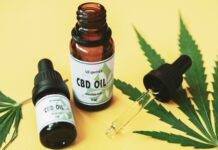
Pro tip: you can get more out of your marijuana experience by doing simple things such as eating chocolate, drinking herbal tea, or getting a massage.
That’s according to Dr. Dustin Sulak, a Maine-based integrative medicine osteopath and cannabis expert. While one might assume that marijuana basically works the same for everyone, that’s not the case. Certain foods, drinks, and activities can bolster the endocannabinoid system, a complex network that responds to components of cannabis, and enhance the plant’s overall effects.
Ingredients in various foods and drinks can stimulate or inhibit CB1 and CB2 receptors in the endocannabinoid system, Sulak wrote in an email. In other cases, foods can influence the production of the fatty acid amide hydrolase (FAAH) enzyme, “which breaks down anandamide, one of our endocannabinoids.”
Take the herb echinacea, for example. It has long been used to enhance the immune system because it “contains compounds that stimulate the CB2 receptor and may inhibit the CB1 receptor,” Sulak said. So for someone suffering from a condition such as arthritis, steeping and sipping some echinacea tea could give marijuana’s anti-inflammatory properties a boost.
Other ingredients that are known to stimulate CB2 receptors and reduce inflammation include black pepper, oregano, cinnamon, and clove, all of which contain the terpene beta-caryophyllene.
Then there are chocolate, galangal, and maca root, all of which inhibit FAAH and increase the levels of anandamide in the body. The more anandamide, the more active the endocannabinoid system.
Another way to augment the endocannabinoid system is by ensuring a healthy balance of omega-3 and omega-6 fatty acids. Western diets tend to include a lot of omega-6, which is found in meat, poultry, eggs, and corn. To achieve a balance, Sulak suggests integrating foods rich in omega-3 such as sardines, salmon, anchovies, hemp seeds, chia seeds, and walnuts, Sulak said
“For those that don’t get enough in the diet, I recommend supplementing with omega-3 capsules …” he said.
At the same time that cannabis consumers can include different foods and drinks in their diet to improve the efficacy of marijuana, Sulak said there are also some foods to avoid, as they’re known to disrupt the endocannabinoid system:
- Processed grains, such as white bread
- Alcohol (specifically, chronic use or binge drinking)
- Refined sugar
- Trans fats
- Foods fried in vegetable oil
- Non-organic foods that contain pesticides
While dietary changes can make marijuana more effective, engaging in stress-reducing activities can also help, Sulak pointed out. Chronic stress depletes the endocannabinoid system, likely due to the increased levels of the stress hormone cortisol, he said Some tried-and-true methods to destress include social interaction, meditation, yoga, massage, and breathing exercises.
“With improved function of the endocannabinoid system, patients might notice a decrease in their required dose of cannabis and [find] that they’re needing to use cannabis less often,” Sulak said. “Activities that naturally stimulate the endocannabinoid system — like exercise, play, singing and bodywork — will likely become more enjoyable and therapeutic.”











